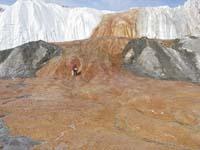Living beings under the ice

Under a glacier they have discovered in Antarctica a living ecosystem that takes about two million years. The ecosystem is located in a lagoon covered by the Taylor glacier, under an ice layer of 400 meters. A team of researchers from Hanover's Dartmouth School has found that at least 17 microorganisms live in this ecosystem.
They have not had to make excavations to reach the lake. The lagoon has an effluent, called Blood Falls, in which eventually the water comes out to water. The research team has taken samples of water extracted for six years, and after analyzing them, it has been able to verify that there are also living beings.
The most surprising discovery is not the presence of living beings, in short, in other conditions that we consider extreme on Earth. The most surprising thing for scientists has been to know how living beings adapt to obtain the energy necessary to live. It is believed that sulfate, very abundant in this water, is used as a catalyst in the complex chain of reaction to obtain energy, and that iron, which is very abundant, is the last receptor of the electrons. Many biogeochemicals considered this to be very difficult because the reaction of iron and sulfate causes pyrite.





